步步高·2016高考英语(人教版)大一轮语法专题《专题3 非谓语动词》文档
步步高-2016中考英语总复习课件 英语-非谓语动词 (共28张PPT)

考点二 动名词的基本用法
4. 常见的后面接动名词作宾语的短语有: 对做……感兴趣 习惯做 推迟做 情不自禁做 值得做 放弃做 be interested in doing have a good time doing/have fun doing 忙于做 be busy doing 做……有困难 have a hard time doing 想做 feel like doing 喜欢做更胜于做 prefer doing to doing 注意做 pay attention to doing 做……开心
考点一
如:
动词不定式的基本用法
I want to play basketball this weekend. 这个周末我想打篮球。 The boy decided to get up early the next day. 男孩决定第二天早点起床。 注意:在常用句型“find/think+it+adj.+to do sth.”中,it作形式宾语,动词不定式作真 正的宾语,放在宾语补足语(adj.)后面。如: I find it great to walk along such a beautiful river bank. 我发现在这么漂亮的河边散步真是太棒了。
考点链接
(
A )2. Tom's mother asked him ________some washing after dinner.
B.does C.do D.did
A.to do
解析:A 本题考查动词不定式作宾补的ask sb. to do, 故选A。
考点链接
(
C
) 3. Doctor Wang often asks us________too much meat.
【步步高 人教版】2016届高三英语大一轮复习语法专题《专题1 动词的时态和语态》文档

专题一动词的时态和语态◆动词时态的考查要点1.一般现在时考点分析(1)表示客观事实或普遍真理(不受时态限制)。
Time and tide wait for no man.(2)表示现状、性质、状态时多用系动词或状态动词;表示经常或习惯性的动作,多用动作动词,且常与表频率的时间状语连用。
They always care for each other and help each other.(3)表示知觉、态度、感情、某种抽象的关系或概念的词常用一般现在时:see,hear,smell,taste,feel,notice,agree,believe,like,hate,want,think,belong to,seem等。
Smith owns a car and a house.All the students here belong to No.1 Middle School.(4)在时间、条件状语从句中常用一般现在时代替将来时。
但要注意由if 引导的条件状语从句中可以用shall或will表“意愿”,但不表示时态。
If you will accept my invitation and come to our party,my family will be pleased.(5)少数用于表示起止或转移的动词如come,go,leave,arrive,fly,return,start,begin,open,close,end,stop等常用一般现在时代替将来时,表示一个按规定、计划或安排要发生的动作。
当be表示根据时间或事先安排肯定会出现的状态时,只用一般现在时。
The shop closes at 11:00 p.m. every day.Tomorrow is Wednesday.2.一般过去时考点分析(1)一般过去时的基本用法:表示过去的事情、动作或状态,常与表示过去具体的时间状语连用(或有上下文语境暗示);用于表达过去的习惯;表示说话人原来没有料到、想到或希望的事通常用过去式。
人教版高考(完整版)非谓语动词大全
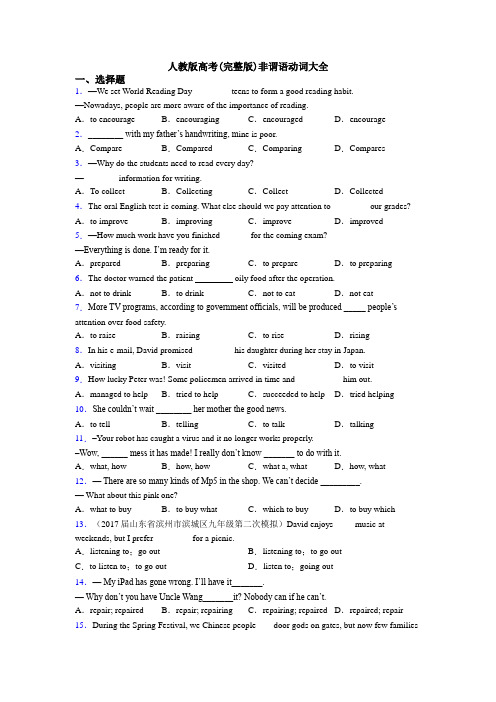
人教版高考(完整版)非谓语动词大全一、选择题1.—We set World Reading Day ________ teens to form a good reading habit.—Nowadays, people are more aware of the importance of reading.A.to encourage B.encouraging C.encouraged D.encourage2.________ with my father’s handwriting, m ine is poor.A.Compare B.Compared C.Comparing D.Compares 3.—Why do the students need to read every day?—________information for writing.A.To collect B.Collecting C.Collect D.Collected4.The oral English test is coming. What else should we pay attention to ________ our grades? A.to improve B.improving C.improve D.improved 5.—How much work have you finished ______ for the coming exam?—Everything is done. I’m ready for it.A.prepared B.preparing C.to prepare D.to preparing 6.The doctor warned the patient oily food after the operation.A.not to drink B.to drink C.not to eat D.not eat7.More TV programs, according to government officials, will be produced _____ people’s attention over food safety.A.to raise B.raising C.to rise D.rising8.In his e-mail, David promised _________his daughter during her stay in Japan.A.visiting B.visit C.visited D.to visit9.How lucky Peter was! Some policemen arrived in time and __________ him out. A.managed to help B.tried to help C.succeeded to help D.tried helping 10.She couldn’t wait ________ her mother the good news.A.to tell B.telling C.to talk D.talking11.–Your robot has caught a virus and it no longer works properly.–Wow, ______ mess it has made! I really don’t know _______ to do with it.A.what, how B.how, how C.what a, what D.how, what 12.—There are so many kinds of Mp5 in the shop. We can’t decide _________.— What about this pink one?A.what to buy B.to buy what C.which to buy D.to buy which 13.(2017届山东省滨州市滨城区九年级第二次模拟)David enjoys ____ music at weekends, but I prefer ________ for a picnic.A.listening to;go out B.listening to;to go outC.to listen to;to go out D.listen to;going out14.—My iPad has gone wrong. I’ll have it_______.—Why don’t you have Uncle Wang_______it? Nobody can if he can’t.A.repair; repaired B.repair; repairing C.repairing; repaired D.repaired; repair 15.During the Spring Festival, we Chinese people ___ door gods on gates, but now few familiesdo so.A.used to put up B.used to put inC.were used to put up D.were used to putting in16.I don’t like sad movies because it usually makes me ________A.crying B.cries C.to cry D.cry17.___________for his good skill, this doctor has a lot of visitors calling for help all the time. A.Knowing B.To know C.Known D.To have known 18.What ______ great fun we had ______ the film Jungle Book.A.a; to watch B./; watching C.a ; watch D./; to watching19.Every morning when the sun ______, plenty of people are watching the ____ of national flag at Tian’anmen Square.A.raises;raise B.rises;riseC.raises;rise D.rises;raising20.My watch doesn’t work. I must have it ________.A.Repairing B.to repair C.repair D.repaired 21.There is something wrong with my DVD player. I’ll have it ________.A.fixing B.to fix C.fixes D.fixed22.A medical team, ________ five experienced doctors and ten skillful nurses, was sent to the earthquake-stricken area in Turkey.A.made up of B.made of C.made from D.made by23.________ as a main dish, this soup is full of meat, vegetables and noodles.A.Serve B.To serve C.Served D.Serving 24.Mrs. White showed her students some old maps ________ from the library.A.to borrow B.to be borrowed C.borrowed D.borrowing 25.—My bike is broken.—Why not have it________?A.repair B.repaired C.repairing D.to repair26.The audience enjoyed the lecture ________ by Hans and Einstein joined in the applause too. A.given B.giving C.to give D.gave27.—Mr Black, my computer is broken, it needs ________.—OK, I will have it ________ tomorrow.A.to be mended; mending B.mending; to mendC.mending; mended D.to mend; to be mended28.It took us one week ________ this article ________ by Mo Yan.A.read, written B.to read, written C.reading, to write D.to read, to write 29.Alice couldn’t make herself ________ attention to because her classmates mad e so much noise.A.pay B.paid C.paying30.一I'm considering how to my new job. Any suggestions?一It's only half an hour's walk, I advise you .A.to go; not to drive B.going; to driveC.to go; not driving D.going; not driving31.The girl is so helpful that she devoted all her spare time she had ________ others.A.to helping B.helping C.to help D.helped 32.While I ____on the street, I found a little boy ______ near the park.A.am walking, crying B.was walking, cry C.was walking, crying D.walked, cry 33.It's impolite to keep someone________ for a long time.A.wait B.to wait C.waiting D.have waited 34.---Is Jack in the next room ?---It’s hard to say. But I heard him _____ loudly when I passed by just now.A.speak B.to speak C.spoken D.speaking35.-Look! So many people are walking into the museum. What are on show?-Some 3D pictures by some modern artists.A.draws B.drew C.drawn D.drawing36.Look! There _______ so many people _________here. Do you know what has happened? A.is, standing B.are, are standing C.are, standing37.This food is cooked by a cook _____ Victor.A.call B.calls C.called D.calling 38.—Mum, my computer doesn’t work. It needs_________ .—OK. I will have it _________.A.repairing; repaired B.to repair; repairC.be repaired; repairing D.being repaired; to repair39.The film _______ real-life events ________ by Li An. It’s moving.A.based upon, directed B.based upon, was directedC.was based upon, directed D.was based upon, was directed40.I think middle school students should not get their hair _______.A.color B.colors C.colored D.coloring41.-This computer doesn’t work. -Really? I will have it tomorrow.A.repaired B.repair C.to be repaired D.be repaired 42.There is something wrong with his TV. He wants to get it _______ this afternoon. A.repairing B.repaired C.to repair D.repair43.I didn't enjoy myself at the party. I just felt __ . — Well, maybe there were too many people at the party.A.left out B.to leave out C.leaving out D.be left out44.I still like those good old songs I listened to _________ myself in my free time.A.enjoy B.enjoying C.to enjoy D.enjoyed 45.The film Hello, Mom! is such a moving film that I think it is well worth________ .A.to watch B.watching C.watches D.watch 46.Seeing their teacher _______ into the classroom, they stopped _______ at once.A.walk; telling B.entering; to speak C.enter; to tell D.walking; talking 47.I prefer _________ some shopping to ________ camping since the weather isn’t lovely. A.do; going B.doing; go C.do; go D.doing; going 48.China has successfully prevented the Covid-19 from _______ through the country. A.spread B.to spread C.spreading D.spreads49.In spring, a mask can be helpful if flowers make your nose uncomfortable.A.wear B.wore C.wearing D.worn 50.Thousands of young people spend hours ______ Wechat moments of their friends every day. A.to check B.checking C.check D.checks 51.When you travel abroad, you can hardly avoid products made in China.A.to buy B.buy C.buying D.be bought52._____ a GPS will make _______ easier for everyone to visit a strange place.A.Take, her B.Taking, that C.Taking, it D.Take, this53.A new high-speed railway ________ Yangzhou ________ Nanjing will be built. A.connected; and B.connects; with C.connected; to D.connecting; to 54.The girl is often seen ____in the art room.A.practice drawing B.practised drawingC.to practice drawing D.practice to draw55.--Would you mind basketball here? I'm writing a report.--Sorry. We'll go and play it on the playground.A.playing B.not playing C.to play D.not to play56.The book written by Mo Yan is worth ______ a second time.A.to read B.to be read C.reading D.being read57.—Look! This photo was taken four years ago!—It’s interesting! I used to short hair, but now I am used to a ponytail (马尾辫). A.wear; tie B.wear; tying C.wearing; tie D.wearing; tying 58.—The Chinese women’s football team has booked the ticket at the Tokyo Olympic Games. —Great. I expect them ________ better.A.do B.did C.to do D.doing 59.Don’t forget ________ the door when you leave here.A.lock B.locking C.to lock D.locked 60.—How much difficulty did you have ________ this problem?—________. It’s quite easy.A.to solve; Nothing B.to solve; None C.solving; None D.solving; Nothing 【参考答案】一、选择题1.A解析:A【解析】句意:-我们设立世界读书日,鼓励青少年养成良好的阅读习惯。
步步高·2016高考英语(人教版)大一轮语法专题《专题6 并列句和状语从句》文档
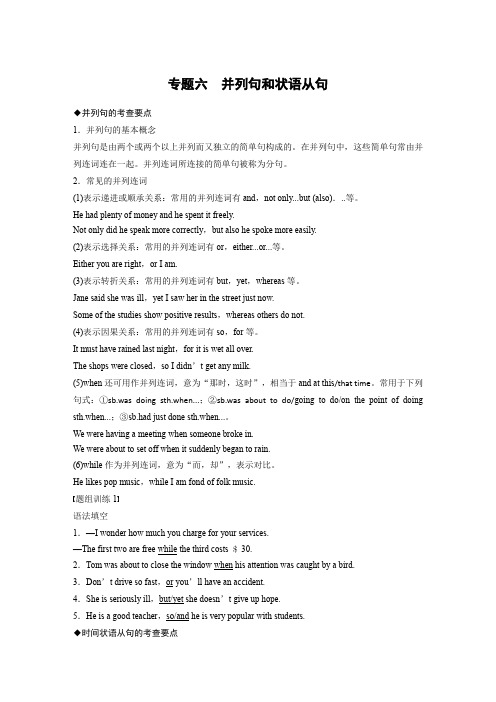
专题六并列句和状语从句◆并列句的考查要点1.并列句的基本概念并列句是由两个或两个以上并列而又独立的简单句构成的。
在并列句中,这些简单句常由并列连词连在一起。
并列连词所连接的简单句被称为分句。
2.常见的并列连词(1)表示递进或顺承关系:常用的并列连词有and,not only...but (also)...等。
He had plenty of money and he spent it freely.Not only did he speak more correctly,but also he spoke more easily.(2)表示选择关系:常用的并列连词有or,either...or...等。
Either you are right,or I am.(3)表示转折关系:常用的并列连词有but,yet,whereas等。
Jane said she was ill,yet I saw her in the street just now.Some of the studies show positive results,whereas others do not.(4)表示因果关系:常用的并列连词有so,for等。
It must have rained last night,for it is wet all over.The shops were closed,so I didn’t get any milk.(5)when还可用作并列连词,意为“那时,这时”,相当于and at this/that time。
常用于下列句式:①sb.was doing sth.when...;②sb.was about to do/going to do/on the point of doing sth.when...;③sb.had just done sth.when...。
We were having a meeting when someone broke in.We were about to set off when it suddenly began to rain.(6)while作为并列连词,意为“而,却”,表示对比。
高中英语语法——非谓语动词、独立主格结构word版 附答案

非谓语动词非谓语动词:顾名思义,即在英语句子中不能单独作谓语而担任其他语法功能的动词。
本单元的重难点及高考考点:一、非谓语作状语;二、非谓语动词作定语;三、非谓语动词作补语;四、非谓语动词作宾语;五、非谓语动词作主语、表语一、非谓语作状语:(一)、不定式作状语:不定式做状语,表示原因,目的或结果。
I、动词不定式作目的状语:为了强调目的,可与in order to 或so as to连用。
其否认式为:in order not to do/so as not to do»1.All the gifts must be mailed immediately(以便圣诞节时能及时收到)。
2., we come here.(为了提高英语)3.The children talked so loudly at dinner table .(我得努力让大家听到我讲话)2^ 动词不定式表原因:be + 形容词+lo do: Pm so sorry to hear your mother is ill.3、不定式作结果状语:不定式表结果常与以下结构连用A.so + adj/ adv + as(not) to do ...(如此...以至于(没)...):Pm not so stupid (才会那样做)B.such + a (adj) n 4- as (not)to do ...(如此...以至于(不)...)Frn not such a fbol .(那样相信)C. enough + n + to do...(足够...)I don't have .(足够的钱买车)D. adj/adv + enough + to do ., , .(足已到/能…)The girl is (够上学年龄了)E. too + adj / adv + to do ... (太...以至于不能...)I'm too tired (再也走不远了)4> .only to do常表示意想不到或不愉快的结果。
【步步高 人教版】2016届高三英语大一轮复习《话题三 日常生活 第二节》文档

第二节真题精练5年真题拓展训练(1)真题深度阅读训练Step One真题体验(2014·新课标全国Ⅱ·阅读理解D)Metro Pocket GuideMetrorail(地铁)Each passenger needs a farecard to enter and go out.Up to two children under age five may travel free with a paying customer.Farecard machines are in every station.Bring small bills because there are no change machines in the stations and farecard machines only provide up to 5 in change.Get one day of unlimited Metrorail rides with a One Day Pass.Buy it from a farecard machine in Metro e it after 9:30 a.m.until closing on weekdays,and all day on weekends and holidays.Hours of serviceOpen:5 a.m.Mon.—Fri.7 a.m.Sat.—Sun.Close:midnight Sun.—Thurs. 3 a.m.Fri.—Sat.nightsLast train times vary.To avoid(避免)missing the last train,please check the last train times posted in stations.MetrobusWhen paying with exact change,the fare is 1.35.When paying with a SmarTrip® card,the fare is 1.25.Fares for senior/disabled customersSenior citizens 65 and older and disabled customers may ride for half the regular fare.On Metrorail and Metrobus,use a senior/disabled farecard or SmarTrip® card.For more information about buying senior/disabled farecards,SmarTrip® cards and passes,please visit or call 202-637-7000 and 202-637-8000.Senior citizens and disabled customers can get free guide on how to use proper Metrobus and Metrorail services by calling 202-962-1100.Travel tips(提示)•Avoid riding during weekday rush periods—before 9:30 a.m.and between 4 and 6 p.m.•If you lose something on a bus or train or in a station,please call Lost & Found at 202-962-1195. 12.What should you know about farecard machines?A.They start selling tickets at 9:30 a.m.B.They are connected to change machines.C.They offer special service to the elderly.D.They make change for no more than 5.答案 D解析细节理解题。
人教版英语非谓语动词专题(含答案)含答案解析百度文库
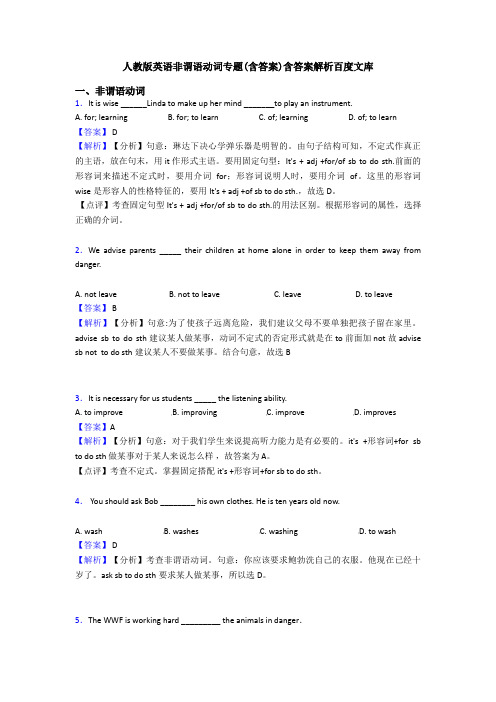
人教版英语非谓语动词专题(含答案)含答案解析百度文库一、非谓语动词1.It is wise ______Linda to make up her mind _______to play an instrument.A. for; learningB. for; to learnC. of; learningD. of; to learn【答案】 D【解析】【分析】句意:琳达下决心学弹乐器是明智的。
由句子结构可知,不定式作真正的主语,放在句末,用it作形式主语。
要用固定句型:It's + adj +for/of sb to do sth.前面的形容词来描述不定式时,要用介词for;形容词说明人时,要用介词of。
这里的形容词wise是形容人的性格特征的,要用It's + adj +of sb to do sth.,故选D。
【点评】考查固定句型It's + adj +for/of sb to do sth.的用法区别。
根据形容词的属性,选择正确的介词。
2.We advise parents _____ their children at home alone in order to keep them away from danger.A. not leaveB. not to leaveC. leaveD. to leave【答案】 B【解析】【分析】句意:为了使孩子远离危险,我们建议父母不要单独把孩子留在家里。
advise sb to do sth建议某人做某事,动词不定式的否定形式就是在to前面加not故advise sb not to do sth建议某人不要做某事。
结合句意,故选B3.It is necessary for us students _____ the listening ability.A. to improveB. improvingC. improveD. improves【答案】A【解析】【分析】句意:对于我们学生来说提高听力能力是有必要的。
【步步高】(新课标)高考英语一轮复习 知识排查突破 book 2 unit 3 computers 新人教版
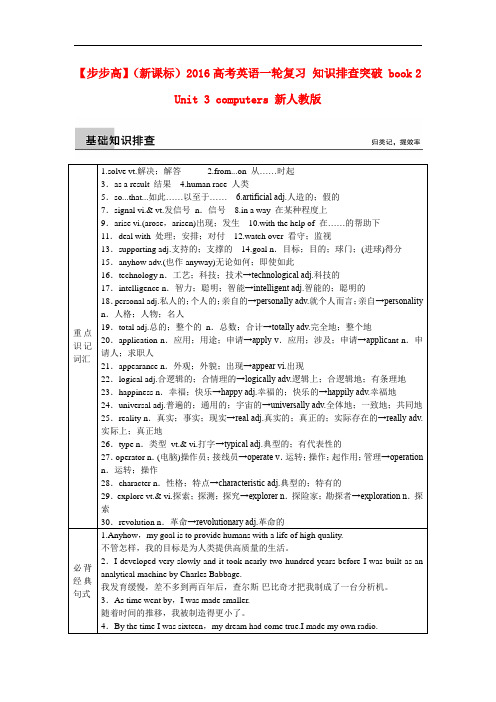
【步步高】(新课标)2016高考英语一轮复习知识排查突破 book 2Unit 3 computers 新人教版重点识记词汇1.solve vt.解决;解答2.from...on 从……时起3.as a result 结果 4.human race 人类5.so...that...如此……以至于…… 6.artificial adj.人造的;假的7.signal vi.& vt.发信号n.信号8.in a way 在某种程度上9.arise vi.(arose,arisen)出现;发生10.with the help of 在……的帮助下11.deal with 处理;安排;对付12.watch over 看守;监视13.supporting adj.支持的;支撑的14.goal n.目标;目的;球门;(进球)得分15.anyhow adv.(也作anyway)无论如何;即使如此16.technology n.工艺;科技;技术→technological adj.科技的17.intelligence n.智力;聪明;智能→intelligent adj.智能的;聪明的18.personal adj.私人的;个人的;亲自的→personally adv.就个人而言;亲自→personality n.人格;人物;名人19.total adj.总的;整个的n.总数;合计→totally adv.完全地;整个地20.application n.应用;用途;申请→apply v.应用;涉及;申请→applic ant n.申请人;求职人21.appearance n.外观;外貌;出现→appear vi.出现22.logical adj.合逻辑的;合情理的→logically adv.逻辑上;合逻辑地;有条理地23.happiness n.幸福;快乐→happy adj.幸福的;快乐的→happily adv.幸福地24.universal adj.普遍的;通用的;宇宙的→universally adv.全体地;一致地;共同地25.reality n.真实;事实;现实→real adj.真实的;真正的;实际存在的→really adv.实际上;真正地26.type n.类型vt.& vi.打字→typical adj.典型的;有代表性的27.operator n.(电脑)操作员;接线员→operate v.运转;操作;起作用;管理→operation n.运转;操作28.character n.性格;特点→characteristic adj.典型的;特有的29.explore vt.& vi.探索;探测;探究→explorer n.探险家;勘探者→exploration n.探索30.revolution n.革命→revolutionary adj.革命的必背经典句式1.Anyhow,my goal is to provide humans with a life of high quality.不管怎样,我的目标是为人类提供高质量的生活。
人教版英语非谓语动词用法总结含答案百度文库
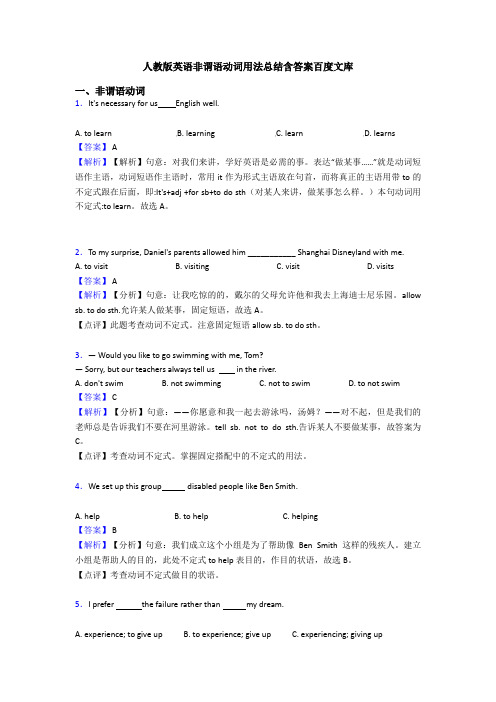
人教版英语非谓语动词用法总结含答案百度文库一、非谓语动词1.It's necessary for us English well.A. to learnB. learningC. learnD. learns【答案】 A【解析】【解析】句意:对我们来讲,学好英语是必需的事。
表达“做某事……”就是动词短语作主语,动词短语作主语时,常用it作为形式主语放在句首,而将真正的主语用带to的不定式跟在后面,即:It's+adj +for sb+to do sth(对某人来讲,做某事怎么样。
)本句动词用不定式:to learn。
故选A。
2.To my surprise, Daniel's parents allowed him ___________ Shanghai Disneyland with me.A. to visitB. visitingC. visitD. visits【答案】 A【解析】【分析】句意:让我吃惊的的,戴尔的父母允许他和我去上海迪士尼乐园。
allow sb. to do sth.允许某人做某事,固定短语,故选A。
【点评】此题考查动词不定式。
注意固定短语allow sb. to do sth。
3.— Would you like to go swimming with me, Tom?— Sorry, but our teachers always tell us in the river.A. don't swimB. not swimmingC. not to swimD. to not swim【答案】 C【解析】【分析】句意:——你愿意和我一起去游泳吗,汤姆?——对不起,但是我们的老师总是告诉我们不要在河里游泳。
tell sb. not to do sth.告诉某人不要做某事,故答案为C。
【点评】考查动词不定式。
掌握固定搭配中的不定式的用法。
【步步高】(新课标)2016高考英语一轮复习 知识排查突破 book 3 Unit 3 The mi
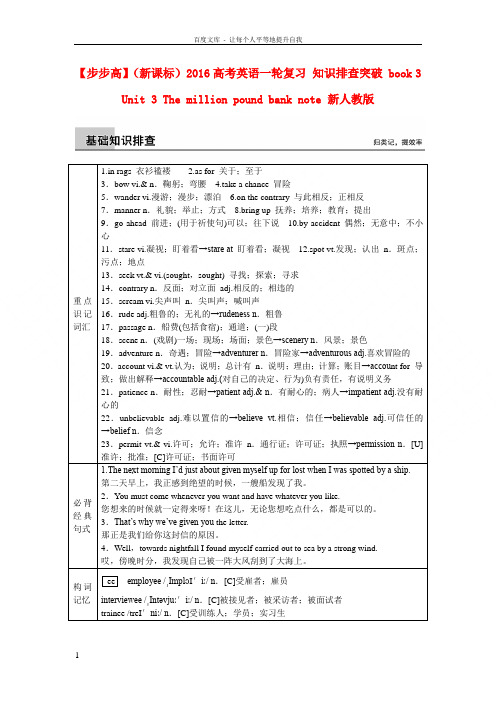
【步步高】(新课标)2016高考英语一轮复习知识排查突破 book 3Unit 3 The million pound bank note 新人教版重点识记词汇1.in rags 衣衫褴褛 2.as for 关于;至于3.bow vi.& n.鞠躬;弯腰 4.take a chance 冒险5.wander vi.漫游;漫步;漂泊 6.on the contrary 与此相反;正相反7.manner n.礼貌;举止;方式8.bring up 抚养;培养;教育;提出9.go ahead 前进;(用于祈使句)可以;往下说10.by accident 偶然;无意中;不小心11.stare vi.凝视;盯着看→stare at 盯着看;凝视12.spot vt.发现;认出n.斑点;污点;地点13.seek vt.& vi.(sought,sought) 寻找;探索;寻求14.contrary n.反面;对立面adj.相反的;相违的15.scream vi.尖声叫n.尖叫声;喊叫声16.rude adj.粗鲁的;无礼的→rudeness n.粗鲁17.passage n.船费(包括食宿);通道;(一)段18.scene n.(戏剧)一场;现场;场面;景色→scenery n.风景;景色19.adventure n.奇遇;冒险→adventurer n.冒险家→adventurous adj.喜欢冒险的20.account vi.& vt.认为;说明;总计有n.说明;理由;计算;账目→accou nt for 导致;做出解释→accountable adj.(对自己的决定、行为)负有责任,有说明义务21.patience n.耐性;忍耐→patient adj.& n.有耐心的;病人→impatient adj.没有耐心的22.unbelievable adj.难以置信的→believe vt.相信;信任→believable adj.可信任的→belief n.信念23.permit vt.& vi.许可;允许;准许n.通行证;许可证;执照→permission n.[U]准许;批准;[C]许可证;书面许可必背经典句式1.The next morning I’d just about given myself up for lost when I was spotted by a ship.第二天早上,我正感到绝望的时候,一艘船发现了我。
新步步高人教版2016届高三英语大一轮复习课件Book8Unit3Inventorsandinven

3 bear vt.承受;忍耐;运送;
生(孩子)
•多词一义
bear,stand,tolerate,
put up with
bear doing/to do...忍受干…… bear sb./sb.’s doing...容忍某人做…… bear sb.to do...忍受某人做…… keep/bear sth.in mind牢记
They will have to bear the misery of living in constant fear of war. 他们不得不忍受长期生活在战争恐惧中的痛苦。 She bore him a daughter,Suzanna. 她给他生了个女儿,苏珊娜。
•特别提醒 •(1)bear表示“容忍,忍耐〞时多与can/could连用, 且多用于否认句和疑问句中。 •(2)bear的过去分词形式,作“生育,生产〞讲时用 borne;作“出生〞或“出身〞时用born。
夯实根底
语法填空 (1)Maryson was born in 1970.(bear) (2)He can’t bear being laughed/to be laughed (laugh) at.
4 call up给……打 (ring up);征 召入伍(draft);使回忆起(recall)
(2)He was distinguished for his knowledge of economics and was elected as head of the economic school. _D_i_st_i_n_g_u_i_sh_e_d__f_o_r_h_i_s_k_n_o_w__le_d_g_e_o_f__e_co_n__o_m_i_c_s,__h__e_w_a_s_ _e_le_c_t_ed__a_s_h_e_a_d__o_f_t_h_e_e_c_o_n_o_m__ic__s_ch__o_o_l.__(用过去分词短 语作状语改写句子)
高考英语一轮复习 语法点专题讲解 非谓语动词-人教版高三全册英语试题
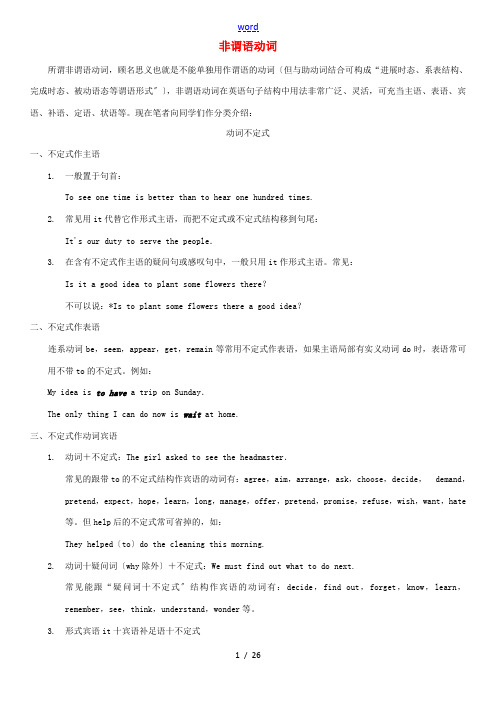
非谓语动词所谓非谓语动词,顾名思义也就是不能单独用作谓语的动词〔但与助动词结合可构成“进展时态、系表结构、完成时态、被动语态等谓语形式〞〕,非谓语动词在英语句子结构中用法非常广泛、灵活,可充当主语、表语、宾语、补语、定语、状语等。
现在笔者向同学们作分类介绍:动词不定式一、不定式作主语1.一般置于句首:To see one time is better than to hear one hundred times.2.常见用it代替它作形式主语,而把不定式或不定式结构移到句尾:It's our duty to serve the people.3.在含有不定式作主语的疑问句或感叹句中,一般只用it作形式主语。
常见:Is it a good idea to plant some flowers there?不可以说:*Is to plant some flowers there a good idea?二、不定式作表语连系动词be,seem,appear,get,remain等常用不定式作表语,如果主语局部有实义动词do时,表语常可用不带to的不定式。
例如:My idea is to have a trip on Sunday.The only thing I can do now is wait at home.三、不定式作动词宾语1.动词+不定式:The girl asked to see the headmaster.常见的跟带to的不定式结构作宾语的动词有:agree,aim,arrange,ask,choose,decide, demand,pretend,expect,hope,learn,long,manage,offer,pretend,promise,refuse,wish,want,hate 等。
但help后的不定式常可省掉的,如:They helped〔to〕do the cleaning this morning.2.动词十疑问词〔why除外〕+不定式:We must find out what to do next.常见能跟“疑问词十不定式〞结构作宾语的动词有:decide,find out,forget,know,learn,remember,see,think,understand,wonder等。
- 1、下载文档前请自行甄别文档内容的完整性,平台不提供额外的编辑、内容补充、找答案等附加服务。
- 2、"仅部分预览"的文档,不可在线预览部分如存在完整性等问题,可反馈申请退款(可完整预览的文档不适用该条件!)。
- 3、如文档侵犯您的权益,请联系客服反馈,我们会尽快为您处理(人工客服工作时间:9:00-18:30)。
专题三非谓语动词◆非谓语动词的考查要点1.动词不定式复习中应注意的几个问题(1)不定式作表语与“be+to do sth.”的异同。
不定式作表语说明主语的内容或性质。
My job is to teach English.(说明内容)be+to do sth.(表示按计划要做的事)He is to go abroad.(2)后接不定式作宾语的词语。
下列词语常接不定式作宾语:afford,promise,refuse,expect,hope,learn,offer,wish,want,fail,plan,agree,forget,like,prefer,decide,manage,try,arrange,determine,desire等。
下列词语后可接“疑问词+不定式”:teach,decide,wonder,show,learn,forget,ask,find out,advise,discuss等。
(3)如何理解和使用不定式作宾补。
①动词(短语)see,watch,notice,hear,listen to,observe,feel,taste,smell,make,let,have等的宾补用动词原形,变被动时要加to,此时的不定式就是主语补足语。
②常用不定式作宾补的几种情况:主语+ask/require/tell/order/force/get/want/like+sb.to do sth.主语+think/judge/suppose/believe/consider/imagine/feel+sb.+to be/to have done主语+call on/upon/depend on/wait for/ask for+sb.+to do sth.(4)不定式作定语的特殊用法。
①下列词语后常接不定式作定语:chance,wish,right,courage,need,promise,time,opportunity,way,the first,the second,the last,the only等。
②不定式作定语和所修饰的名词在逻辑上有主谓关系。
There is no one to look after her.③不定式与被修饰的名词在逻辑上有动宾关系。
She is now looking for a room to live in.(5)不定式作状语的用法。
不定式作状语,在句中主要表示目的、结果、原因等。
only to do表示出人意料的结果。
We hurried to the classroom only to find none there.in order (not) to,so as (not) to用来引导目的状语;enough...to,so...as to do,such+名词...as to do作结果状语。
The girl was so kind as to help the old man off the bus.I’m not such a fool as to believe that.(6)不定式的完成时的特殊用法。
①表示不定式中谓语动词发生的动作先于主句的谓语动词发生的动作。
The novel was said to have been published.I regret to have been with you for so many years.seem,appear,be said,be supposed,be believed,be thought,be known,be reported等动词常用于上面句型。
此外,glad、happy、satisfied、sorry、surprised、disappointed后也接完成时,但要注意与一般时的区别。
I’m sorry to keep you waiting for a minute.对不起,请稍等。
(说话时还未等)I’m sorry to have kept you waiting.对不起,让你久等了。
(说话时已等了很久)②不定式的完成时还可表示“过去本想做某事但未做”的虚拟语气。
(A)should like to/would like to/would love to+完成时。
(B)was/were to+不定式的完成时,表示该做某事或想做但未实现。
(C)expected/hoped/meant/promised/supposed/thought/wanted/wished+不定式的完成时,表示过去未曾实现的愿望。
(7)不定式的省略。
①同一结构并列由and或or连接。
I want to finish my homework and go home.I’m really puzzled what to think or say.特例:To be or not to be,this is a question.It is better to laugh than to cry.(表示对比)②不定式作表语,其前面的主语从句中含有do时,后面的to省略。
What he did was lose the game.③句中含有动词do时,but,except,besides,such as等后面的to可省略。
即“前有do,后省to”。
Don’t do anything silly,such as marry him.④主句含有不定式,后面有rather than,rather than后省to。
⑤Why not,had better,would rather,can’t but等词后省to。
You’d better take it seriously.⑥多用在同一句或联系紧密的对话中,为了避免重复,作宾语、主补或宾补的不定式再次出现时,to后的内容常承前省略(只保留to即可)。
但如果承前省略的不定式有助动词have或be的任何形式,后应该保留原形have或be。
Susan is not what she used to be.—You came late last night. You ought to have finished your homework.—I know I ought to have.常见的有:I’d like/love/be happy to。
题组训练1用所给动词的适当形式填空1.It’s important for the figures to be updated(update) regularly.2.Today we have chat rooms,text messaging,emailing...but we seem to be losing(lose) the art of communicating face to face.3.If they win the final tonight,the team are going to tour around the city to be cheered(cheer) by their enthusiastic supporters.4.The difference in thickness and weight from the earlier version makes the iPad 2 more comfortable to hold(hold).5.Simon made a big bamboo box to keep(keep) the little sick bird till it could fly. 6.Passengers are permitted to carry(carry) only one piece of hand luggage onto the plane. 7.More TV programs,according to government officials,will be produced to raise(raise) people’s concern over food safety.8.The ability to express(express) an idea is as important as the idea itself.2.动名词复习中应注意的几个问题(1)下列动词后只能接动名词:suggest,finish,avoid,can’t help,mind,enjoy,require,practise,miss,escape,pardon,advise,consider,imagine,keep,appreciate,permit。
(2)下列动词短语后接动名词:leave off,put off,give up,look forward to,feel like,have trouble/difficulty (in),devote to,be/get used to,pay attention to,be fond of,be worth。
(3)介词后要接动名词;what about,how about,be fond of,be good at等的介词后接动名词。
注意on/upon doing sth.=as soon as 引导的从句,作此意讲时on/upon后也可以接名词。
On his arrival at the station,he found the train had just started.(4)动名词作宾语和动词不定式作宾语的区别:①begin,start,continue,like,love,dislike,hate,prefer,can’t stand语法填空1.It’s no use complaining(complain) without taking action. 2.Lydia doesn’t feel like studying(study) abroad. Her parents are old. 3.Being exposed(expose) to the sun will do harm to your skin. 4.She is afraid of being taken(take) to the public.5.Mary’s coming(come) late made her mother angry.3.现在分词复习中应注意的几个问题(1)现在分词在句中作时间、原因、伴随、条件、结果等状语。
①时间状语(分词前面可加when,while等)Hearing the good news,he jumped with great joy.②原因状语Not having finished her work in time,the boss fired her.Seeing nobody at home,he decided to leave them a note.③伴随状语The girls came in,following their parents.④结果状语The poor old man died,leaving nothing to his children.注意:现在分词作状语的几个特性:①时间性。
